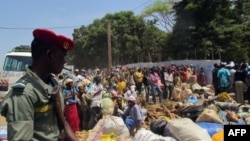The United Nations reports attacks on humanitarian workers are seriously hampering efforts to provide relief for hundreds of thousands of people who were forced to flee their homes in the Central African Republic.
Although the media and world at large appear to have forgotten the plight of millions of people in C.A.R., the United Nations reports that war-torn country is still experiencing a huge humanitarian emergency and a displacement crisis.
The latest figures show about 410,000 people have been forced out of their homes and are dependent on international aid.
Added to these problems is the worsening violence and increased attacks against aid workers. This is making it more difficult and dangerous to reach those in desperate need of assistance.
The United Nations reports 19 security incidents in which eight national aid workers were killed took place between the start of the year and September. The number of incidents is increasing; the U.N. notes seven more attacks against humanitarian aid workers occurred between October 7 and 19 alone.
At the same time as this month's unprecedented attacks against humanitarian workers, U.N. Children’s Fund spokesman Christof Boulierac says dangers are increasing for the population across the country.
“Across the Central African Republic, more than 2.3 million children have been affected by the crisis since intense fighting reached Bangui last December, forcing nearly one million people to flee their homes. UNICEF has verified that six children died and 22 were injured in the eight-day intensification of fighting in the city earlier this month, including two children brutally killed after they were accused of spying. UNICEF also received reports that wounded children and pregnant women were not able to access hospitals because of roadblocks or because they feared being targeted," said Boulierac.
Despite the growing violence, Boulierac says UNICEF is rushing critical supplies to thousands of children forced to flee their homes.
The World Food Program notes the security situation in C.A.R. also is creating critical obstacles to its ability to distribute food. A recent joint assessment by WFP and the Food and Agriculture Organization finds the crisis has caused a sharp deterioration of the food security situation. WFP spokeswoman Elizabeth Byrs says the outlook for the country is bleak.
“We can see that food reserves in rural areas are estimated at 40 percent to 50 percent lower than average, following recurrent lootings and widespread insecurity. We can see also a decrease in the quantity and quality of meals in the country. This crisis has significantly worsened the food security in a country where already between one-quarter and one-third of the total population is food insecure," said Byrs.
WFP reports it was able to reach just over half of 480,000 people targeted for food distribution in the north of the country last month, and that it was forced to suspend such assistance in the capital, Bangui, on September 8. Only in the past few days has WFP been able to resume food deliveries to 26,000 IDPs in the city.




